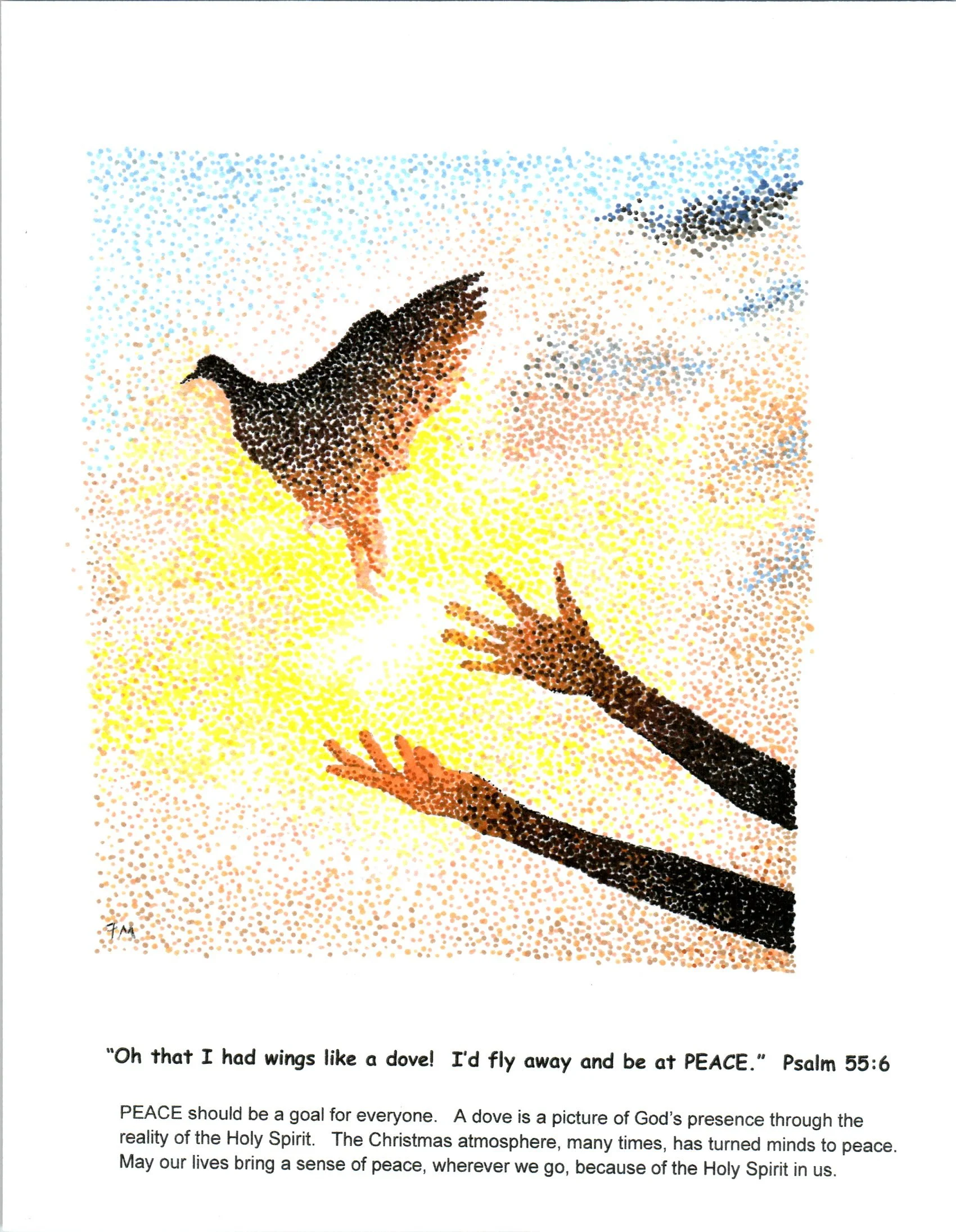Saturday December 6
Isaiah 40: 1-11
In The Carpenter’s Shop
Mary sat in the corner dreaming,
Dim was the room and low,
While in the dusk, the saw went screaming
To and fro.
Jesus and Joseph toiled together,
Mary was watching them,
Thinking of kings in the wintry weather
At Bethlehem.
Mary sat in the corner thinking,
Jesus had grown a man;
One by one her hopes were sinking
As the years ran.
Jesus and Joseph toiled together,
Marys thoughts were far
Angels sang in the wintry weather
Under a star.
Mary sat in the corner weeping,
Bitter and hot her tears
Little faith were the angels keeping
All the years.
Sara Teasdale
Sunday December 7
Isaiah 11: 1-10
“Oh that I had Wings like a dove! I’d fly away and be at PEACE.”
Psalm 55:6
PEACE should be a goal for everyone. A dove is a picture of God’s presence through the reality of the Holy Spirit. The Christmas atmosphere, many times, has turned minds to peace. May our lives bring a sense of peace, wherever we go, because of the Holy Spirit in us.
Ford Mastin
Monday December 8
Isaiah 24: 1-16a
These verses are not ones usually associated with Advent. One commentary labels them "The Land Desolate Because of Sin." Some think the verses apply to everyone while others think they just refer to Israel because they speak of a broken covenant, statutes, and laws.
There is no joy in the land because the vineyards are destroyed and the land is laid waste. There is chaos and confusion. Thee verses warn of the price people pay when they ignore God's laws and live self-centered lives.
What do these verses have to do with Advent and the week's theme of peace? They surely show a reason for Jesus to come as people needed a savior. Jesus said he wanted us to have life and have it more abundantly--not suffer the consequences of sin. There is no peace in these 16 verses.
One song often sung at Christmas by Jill Jackson and Sy Miller says in part:
"With God as our Father
Brothers all are we
Let me walk with my brothers
In perfect harmony . . .
Let there be peace on earth and let it begin with me."
We can't control others, but we can do our part to contribute to the peaceful lives of those around us.
Lynda Pence
Tuesday December 9
Isaiah 41: 14-20
Poetic Promises
Isaiah 41:14-20 is a poem in which Isaiah speaks for the LORD. He tells the Israelites not to fear because he imagines “the Holy One of Israel” telling them “I will help you.”
The poem is a beautiful, imaginative description of ways the Holy One will help the Israelites by enabling them to grow their food when they return from the exile. He promises that He will not forsake the poor and needy but will provide water for them when they are ”parched with thirst.”
Isaiah’s Holy One also promises to grow useful trees in the wilderness, as well as in the desert, and this will be done
so that all may see and know,
all may consider and understand,
that the hand of the Lord has done this,
the Holy One of Israel has created it.
During Advent we might think about how Luke’s story of Jesus’s birth includes similar promises, this time not only to Israel but to “all generations.” As in Isaiah, the prophecies promise help--especially to the “poor and needy.”
Today these promises have been fulfilled for some of us, but many people suffer from violence, starvation, and destruction (Gaza and Sudan, for example). If so, the results might lead us to the conclusion that if “the hand of the Lord has done this” good work, the work is not complete and we might not believe that “the Holy One of Israel” is worthy of our praise.
But poetry is not a blueprint; it is more like a song. Poems create a beauty, an inspiration in their imagery and music that brings us hope that might have little to do with what our world actually looks like. So, in an often hungry and warlike world, “all may see and know” that in ways sometimes difficult to discern, we are cared for.
Joe Hall
Wednesday December 10
Genesis 15: 1-18
We have the great gift of experiencing peace that surpasses all understanding. Peace that is not of this world and not dependent on our circumstance, good or bad. Peace that comes from God and is freely given. Peace that relieves troubled hearts and drives out fear. While God provides the peace, we are to position ourselves to receive and reciprocate.
The Apostle Paul instructs believers in Colossians 3:15-16, “Let the peace of Christ rule in your hearts, since as members of one body you were called to peace. And be thankful. Let the word of Christ dwell in you richly as you teach and admonish one another with all wisdom, and as you sing psalms, hymns, and spiritual songs with gratitude in your hearts to God.” This calls us not to a formulaic response but an intentional surrender and heart posture of peace and thankfulness as we live our lives in light of Christ. We rejoice in His peace, despite the circumstance, when we sing, “It is well with my soul; It is well.”
This peace should produce willful worship to God and community among His church. It is my sincere prayer that the peace of Christ would rule in your heart today and each day during this season.
Michael Martin
Thursday December 11
Ruth 1: 6-18
A Peaceful Christmas
Have you ever had a peaceful Christmas? In most Advent and Christmas seasons my family life was hectic and busy, not peaceful. Lots of shopping, decorating, and other activities were more stressful than peaceful. But I can think of two examples of a quieter, peaceful Christmas. In 1970 Patty and I stayed in our small apartment in Louisville rather than travel home. Our first child was due in January, and travel seemed unwise. In 2020 my daughters and I all stayed in our homes and had a Zoom Christmas, since Covid was a serious threat. Those Christmas seasons were quiet, but maybe not peaceful in the best sense.
The Ruth text involves a famine, migration, deaths of spouses, and other turmoil. Naomi hopes her two daughters-in-law will experience “rest” (1:9). Their lives had been in turmoil, but now Naomi was headed back to her Hebrew home, Bethlehem. What would “peace” look like for these women? If you are familiar with how the story ends, you know another marriage and the birth of a child signal a pivotal moment in Hebrew history. Ruth, that new mother, is mentioned in Matthew 1:5 as an ancestor of Jesus.
If you seek a peaceful Christmas this year, make sure Jesus, the Prince of Peace, is at the center of your celebrations. I do not know what the news will be about Gaza and Ukraine on December 25, but I know we can experience peace with God through the gift of God's Son. Include public worship in your Advent season.
Warren McWilliams
Friday December 12
Ruth 14: 13-17
Peace
I often feel most at peace in nature. The sounds of limbs rustling, leaves shifting, and animals scurrying all creating a white noise that feels like an audible rest for my brain. Away from the busyness of life and the cacophony of sounds that accompany work and home – these simple moments bring a reset to my system that resembles peace.
Peace and busyness seem at odds with one another. Can one have peace and be toiling in busyness simultaneously? Do we miss the opportunity for peace when we take on just one more task? It is only one more thing to do…but if we want to approach peace with intentionality, does our innate desire to say “yes,” negate the good work of rest to which we are called by God?
Peace can mean something different to everyone. Are we discussing inner peace, world peace, a peace offering between warring enemies? For me, peace is a feeling of calm, safety, and harmony within myself and my relationships. It is also a protection against harm. In Philippians 4:7 it says, “…the peace of God…will guard your hearts and your minds.” Much like putting on the armor of God, the peace we find in Christ further protects us from the volatility of the world.
Reflect on the following passage:
“Peace I leave with you; my peace I give you. I do not give to you as the world gives. Do not let your hearts be troubled and do not be afraid.”
John 14:17
During Advent, I feel that we are called to focus our minds on things less chaotic, less volatile, and ideally more hopeful. In this calling, peace is at the forefront of the plan. Cultivating space for peace is not easy – especially in our culture of holiday plans and grinding work schedules. But, how can you choose to be more peaceful amid the chaos? Can you think of a place or a time when you felt really peaceful? What made it feel that way? If so – how can you cultivate that feeling in your life now?
Meredith Bailey


